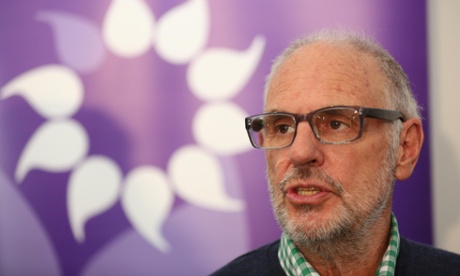Increasing profile as a result of medical board’s action creates a paradox for tribunal, euthanasia advocate says

The suspension of Philip Nitschke’s medical registration has prompted an increase in people joining the pro-euthanasia organisation Exit International and boosted sales of his controversial book, he said on Tuesday.
“The fact is that the focus of activity has actually pushed numbers of people wanting to come to [Exit International] workshops up so if [the suspension] is effectively an action … to protect the Australian public then it’s having exactly the opposite effect,” he told Guardian Australia.
The euthanasia advocate said sales of his book were “higher than they have ever been” and that the argument created a “paradox” for the tribunal.
Nitschke said the Northern Territory medical tribunal hearing into the suspension of his registration was in part about protecting the reputation of the medical profession.
That argument was also heard inside the hearing, which is considering Nitschke’s appeal against emergency action taken by the medical board to suspend his registration in July. It followed an allegation he counselled a depressed but otherwise healthy man, Nigel Brayley, to take his own life after the pair met briefly at an Exit International workshop in Perth.
The South Australian division of the Medical Board of Australia said it acted in order to “keep the public safe while other investigations or processes continue”.
Since Nitschke had frequently indicated he would continue his work as a euthanasia advocate even without his medical registration, the tribunal chairman, Calvin Curry, questioned whether stripping him of that registration was more about protecting the reputation of the medical profession than protecting the public.
“It’s not about saving the soul. It’s about a medical practitioner saving the soul,” Curry suggested.
Lisa Chapman, acting for the Medical Board of Australia, said the consequence of not taking the immediate action would be that a person with one-on-one contact with Nitschke would be “consulting with a registered medical practitioner”.
“Taking away his registration is signalling the board disapproves of his action?” Curry later questioned.
“In a sense, yes,” Chapman replied. “The board and the tribunal have an important role and yes, it is about signalling that this person poses a serious risk.”
She said while the board didn’t have the power to stop conduct outside the remit of medical care – giving the examples of child pornography or sexual assault – it could stop that person practising medicine and reduce the risk to the public.
Chapman defended the immediate action taken by the board against Nitschke, and told the tribunal that “proof of [the] conduct” was not necessary, only “a reasonable belief as to serious risk”. But she conceded such a belief might be more relevant to a doctor who has been accused of assaulting a patient.
Nitschke said outside the hearing that the argument amounted to saying he needed to be suspended in case his status as a doctor influenced even one person considering euthanasia.
“However, then the counterargument is that … the reputation that one gets from not having a medical degree then gives status to the information, [it says] that this information is so dangerous people must not have it,” he said.
Throughout the hearing the medical board has said Nitschke had a duty to intervene when Brayley told him of his intentions, but Nitschke’s lawyers have maintained that he was not Brayley’s doctor, did not counsel him and that the suspension was driven by the board’s distaste for Nitschke’s views.
Chapman argued that misconduct was not limited to doctors within a doctor-patient relationship.
“It’s not a matter of saying, ‘I’m going to decide when I wear that hat.’ The legislative scheme is that you wear that hat all the time,” Chapman said.
Arguments about the definition of rational and irrational suicide and the impact that has on the duty of a doctor were also extensively explored.
On Monday it was revealed the medical board has referred 12 other matters of alleged professional misconduct by Nitschke to the tribunal, to be heard at a later date regardless of whether Nitschke is successful with the present appeal.
The hearing continues.
